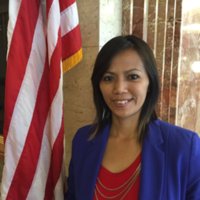
My name is Ima Matul, and I’m originally from Indonesia. I’m a survivor of minor domestic servitude for three years. I was physically abused. I did not get paid, and I finally escaped with the help of the neighbors. I wrote a letter to the neighbors, and it took me awhile to give that letter. I don’t have the courage to do it, and I was so scared. I was what happens if my trafficker find out and all that, so it took me a long time. I finally have the courage to do it, and they helped me escape and took me to CAST.
Since then CAST has been helping me with everything. They helped me with life to get my life back together and to get on my own feet and to be independent on my own. Learning about skills in life that I need. They send me to school to learn English, because I don’t speak much English when my trafficker brought me here. Anyway the reason I want to become an advocate, because number one I want to give back and because like all of you here are willing to help a survivor of trafficking. That’s why I want to give back, because all of you organizations like CAST and the other organizations, it’s helping the survivors. You don’t even know us, and you are willing to help us.
Number two because I want to help the other survivor giving them hope, because when I was in that situation I don’t have hope. We don’t know anywhere. We came to this country. We know nothing about this country, so if I escape I don’t know where to go, if people are going to help me or not. I couldn’t believe that all of you are here to help us. I want to give them hope not to give up. There are people out there that care so much about the issue.
One other thing is that survivors have very powerful voices, and we’re here not to tell our story, and it’s been since 2000 I believe that this legislation passed the law about human trafficking. I believe it’s enough to tell what happened to us, and we need to go beyond more than telling our story. We have a very powerful voice. Our story can impact other people, to legislators. For example, when we go to Sacramento for a bill that have to be passed some senator or legislator don’t want to support the law, because they don’t think it’s important. After they hear our story, we tell them that it’s very important to us to have this law passed. Then they change their mind. That is great.
Also a survivor can give the courage to other survivors. For example, the Survivor Caucus at CAST, we have a shelter like once a month that we do at the end of the month to get together with the survivors and also the survivors that are in the recovery times. They’re still in the process of prosecuting the trafficker. One person told me it’s great to have a survivor who’s already independent to come to talk with others. We’re giving them courage to see us like oh wow. They were like me, and now that they have family they have a car. They know how to drive, and they have a fulltime job. It’s giving the courage to do. Not to give up, because some survivors after what happened to them, they decided to go home. They think they’re not worth it, but they’re wrong.
The Survivor Caucus, in the beginning of 2011, we launch our first national network. We have our Facebook page, and it’s private. It’s for survivors only, and we meet once a month conference call. That was like this is a group of national network is very unique. It’s like from all types of survivors that comes together. It doesn’t matter the survivor of domestic servitude or sex trafficking. We all come together to talk about the issue, to work on something, to make the law better. Last year in September, we work on something we created for the first time that domestic survivor and U.S. citizen survivor come together. We wrote our first joint testimony to help pass the law.
I’m not sure if it’s already passed, but you know we went to D.C. We attend the hearing, and we joined the testimony. It was the first time that foreign survivor was a U.S. Citizen survivor, because people think that some only concentrate on sex trafficking. They think that sex trafficking the story of more sad. What happens to them is worse but actually we’re all the save thing. Trafficking is trafficking. It doesn’t matter sex. It doesn’t matter domestic worker. We all suffer the same thing, so that’s why this national network is very good for us to get together not just think that sex trafficking is more important than domestic work. I think that’s all that I can share, and thank you very much.
Narrative as told to the Slavery No More: Global Human Trafficking Conference, August 2012, Los Angeles.








